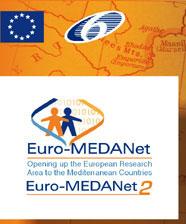
he Mediterranean scientific community can now participate in the 6th Framework Programme for research of the European Union more effectively thanks to the Euro-MEDANet and Euro-MEDANet2 projects. The main outcome of the two projects, which are coordinated by the National Documentation Centre (EKT) in Greece, is the establishment of Information Points in seven Mediterranean countries outside the EU. These Information Points operate as national structures that support research organisations that wish to participate in the European research programmes while, at the same time, they help the interested organizations of each country to become more familiar with the institutions and the procedures of the EU.
The main aim of the Euro-MEDAnet and Euro-MEDANet2 projects (www.euromedanet.gr) is to open up the European Research Area to the Mediterranean countries. The projects, which are funded by the programme "Special support measures of the international cooperation – INCO" (6th Framework Programme), have partners from Algeria, Egypt, Jordan, Lebanon, Morocco, Syria and Tunisia, in which the above-mentioned Information Points have been created, as well as from France, Italy, Spain and Turkey who, together with the Greek coordinator, are responsible for the transfer of the relevant know-how.
The Information Points operate in every country as mechanisms that inform and support the research organisations about the pre-requisites and the procedures of participation in the Framework Programmes for the EU research, in order to be able to participate as partners or as coordinators in the consortia of European projects.
As envisaged by Mr Evangelos Bouboukas, the Director of EKT, "the priority for EKT, as project coordinator, is not only to transfer the knowledge and expertise it possesses in the field of European programmes but also to establish a strong human network between the organisations involved."
The coordinating role of EKT in the above projects is integrated into the framework of the strategy for enhancing the cooperation of the EU, and specifically of Greece, with the above countries in the field of R&D, through the convergence of the national research initiatives and the realisation of the European Research Area. To further this aim, EKT also participates in nine European projects for the scientific cooperation and networking in Europe, the Mediterranean region, the West Balkans and the Black Sea.
Actions of the Euro-MEDANet and Euro-MEDANet2 projects

The main activities of the two projects involve the creation and operation of Information Points for the European research programmes (similar to the National Contact Points for the Framework Programme for research in EU Member States), the mapping of the research and technological infrastructure in the Mediterranean countries, the planning and production of information material and the training of personnel.
The kick-off meeting of the projects was held in Athens, in May 2004. Since then, a series of seminars has taken place in Athens, Italy and Spain, in order to train the personnel of the Information Points of the Mediterranean countries. The organisations that are interested in participating in the EU Framework Programmes have been recorded and a series of awareness campaigns has been organised in each of the seven Mediterranean countries. Every Information Point has also developed its own web site to promote FP6, according to the needs of the local scientific community.
After the completion of the Euro-MEDANet and Euro-MEDANet2 projects, in April and May 2006 respectively, the Information Points will be financed by, and operate under, the supervision of their competent national R&D authority.








